|
|
|
|---|---|
|
Taiwan's Lee slams 'slave state' China, calls for economic boycott |
|
|
Friday October 21st, 2005 Los Angeles, (AFP) - Taiwan's former president Lee Teng-hui has accused China of being a "slave state" that uses the false promise of its booming economy to dupe the free world into appeasing its tyranny. 
In an explosive speech in Los Angeles on the last leg of a 13-day US tour that has infuriated Beijing, Lee called for capitalist nations to shun investment in China that he likened to the 1930s appeasement policy towards Adolf Hitler and later towards Russian leader Joseph Stalin. "As long as the capital from free countries continues to pour into China, China's already oppressive practices will become more entrenched and the ensuing and ever-expanding militarism will make the likelihood of transition to a peaceful country ever more unlikely," he said. He said the United States and the world community can influence whether China chooses to pursue regional domination or embrace democracy and should unite to promote freedom in the world's most populous country. "Free nations must develop and strengthen their global and regional cooperation in both supporting the people of China in their struggle for freedom and democracy as well as taking measures to stop Chinese acts of oppression and aggression. "Only in this way will we eventually see a China that is ready to take its place among the family of free nations in Asia," he added in a speech that received a standing ovation from around 100 academics, business leaders and US Representative Dana Rohrabacher. Lee accused the West of using a double-standard in the way it engages communist China compared to its isolation of the former Soviet Union that ultimately contributed to its collapse. "People in the West believed that Soviet human rights violations and threats to neighbouring countries should be stopped. "But they believe that China's violations of human rights and threats to neighbouring countries are 'special Chinese characteristics' that can be tolerated," he said. He said China was using oppression to "create illusory economic growth" that woos foreign investment that allows China "to rapidly build up the economic, military, technological and diplomatic power of its slave system". "Under conditions that are tantamount to enslavement by the state, business from capitalist countries are enticed by cheap, obedient labour and cheap land and facilities owned by the state," he said. Lee, whose last US visit in 1995 prompted Beijing to fire missiles into shipping lanes off Taiwan's two major ports, said his country's democracy was threatened by China and its military might and called on the United States and the world community to stand up to Beijing. Lee said China and neighbouring North Korea were the last-remaining "slave states" holding back the advance of democracy in Asia and threatening the region's security. "If China insists on maintaining its one-party dictatorship, if it continues to exploit and suppress its people at home and expand its military threats against its democratic neighbours, then China will retain its current status and we will continue to witness the rise of a militarist hegemony," he said. The speech by Lee was by far the most incendiary towards Beijing of his US visit, eclipsing the rhetoric he used in Washington. Lee, 82, retired in 2000 after 12 years as Taiwan's president, but remains an influential figure on the island and a firm supporter of Taiwan's independence. China, which has regarded Taiwan as a renegade province since its first government was formed in 1949, has slammed Lee's visit and complained about some of the comments he has made on the tour. Lee, who engineered Taiwan's transition from dictatorship to democracy after taking power in 1988, has long been a thorn in Beijing's side. China has warned him not to call for Taiwan's independence and has threatened to reclaim the island by force if it ever formally declares independence. The United States switched diplomatic recognition from Taipei to Beijing in 1979 but is obliged by law to offer Taiwan a means of self-defence if its security is threatened. The White House has said that President George W. Bush and senior administration officials did not meet Lee, who returns to Taipei on Sunday, during his visit, amid rumbling from Beijing. But Dana Rohrabacher, California representative from Bush's Republican party, said it was time for Washington to stop pussy-footing around Beijing, saying human rights were more important than business dollars. "I'm not worried so much by whatever the reaction from Beijing will be," he told reporters referring to Lee's hard-hitting speech. "It's time for the United States government to stop bending over backwards and trying not to make the dictators that run the government in Beijing angry because we are being too friendly with people who elect their own democratic government in Taiwan," he said.
|
|